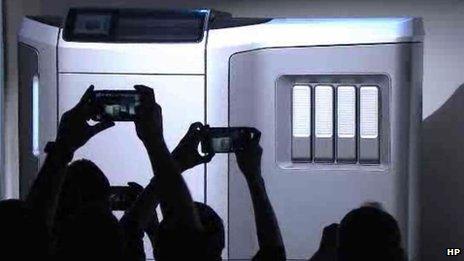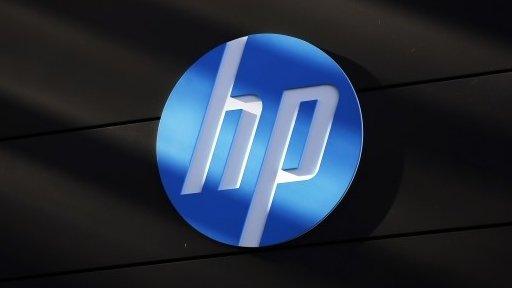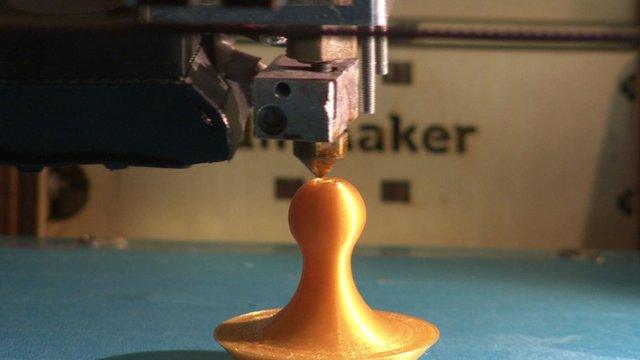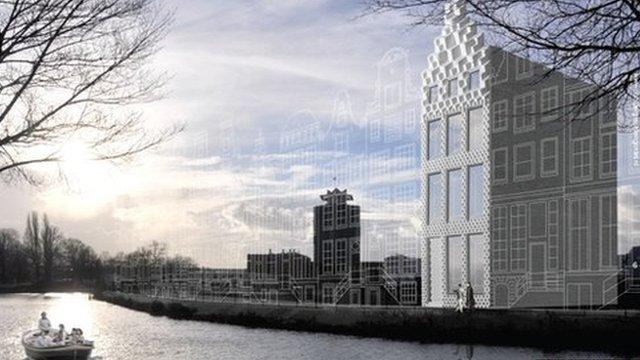HP looks to 3D printing market to boost performance
- Published

HP unveiled its 3D printer at a launch event in New York
Technology giant HP has announced the launch of a 3D printer it claims will be 10 times faster than current models.
The company also unveiled a new computer with built-in scanner, projector and touchpad at an event in New York on Wednesday.
The firm is hoping the products will help stir up a stagnant PC market.
One expert said printing companies were facing tough times and that HP needed its 3D printing to "work and to work well".
The firm said that 3D printing remained a niche technology because it was a slow process and, besides very expensive models, the printers turned out low quality products.
But it claimed that its own printer would be faster - and consequently cheaper - for manufacturers. HP also said that, for its price, it would turn out a better-quality product than its competitors.
HP's senior vice-president, inkjet and web solutions, Steve Nigro, said the printer would be on sale for a "lower cost than any others in its class". But he did not specify an expected retail price.
'Dwindling prospects'
Analysts identified HP as one of the companies that needed to capitalise on the potentially large market for 3D printing to offset the stagnation in their core areas of business.
"We estimate that the global 3D printing market is set to grow from $1.15bn (£930m) in 2013 to $4.8bn in 2018," said Arnaud Gagneux, vice-president, technology transformation, at CCS Insight.
Joris Peels, an expert on 3D printing, said: "The existing 2D printing companies face dwindling prospects, with kids increasingly growing up in a world virtually without paper."
Mr Peels worked for HP as a consultant on its 3D printing endeavour but was not employed to work on this project.
"Competing tablet products such as Amazon's also have better business models than HP's tablets since Amazon's and Apple's tablets put a store in the consumer's hand letting these vendors make more revenue over time.
"HP needs 3D printing to work and to work well," he said.
Peels said that the printer technology differed from other methods because it "hardens the entire layer in one pass and also uses several chemical compounds to do so. Existing technologies draw out a layer one curve at a time using heat or light".
This, he said, accounted for its purported relative speed.
.jpg)
The "multi-jet fusion" 3D printer is scheduled for release in 2016
The "multi-jet fusion" printer will not be released to the open market until 2016, following a period of collaboration with certain users, during which it hopes to fine-tune the product.
Sprout venture
In a departure for the firm, HP also announced that it would share its 3D printing technology in a bid to get feedback from experts.
The company said it had waited until it had the right product ready before moving into 3D printing.
But Mr Peels said that by "announcing now and only launching in 2016, HP is giving EOS, 3D Systems and Stratasys years to come up with alternatives and build competing machines."
The Sprout computer, which combines scanner, projector and touch pad, will be available to order online from Thursday 30 October and will be for sale in stores in the US from 9 November. It will cost $1,899 and the company said that launch dates for other countries would follow.
It has a sensor-laden mat on the desktop, instead of a mousepad and runs on Microsoft's Windows 8. It also has display-mounted 3D scanner and projector that creates a digital image of objects placed on the mat.
.jpg)
The Sprout computer has a touchpad mat and a mounted 3D scanner
The images are projected on to the desktop, which a user can edit by touch. At its launch event, HP demonstrated how items could be placed on the mat, scanned and incorporated into designs on the screen.
Eric Monsef, who heads the project for HP, said the initial production run would be modest but could be scaled up if needed.
The key is to attract developers for a new Sprout marketplace or apps store, for specifically designed software that can take advantage of 3D capabilities.
'No competition'
It would come with apps from Dreamworks Animation, Skype and Evernote, among others.
"It's about getting people excited again," Mr Monsef told Reuters. The hope is that Sprout will entice more developers as time goes by, who will in turn devise novel ways to make use of the technology, he said. "Day of launch, we're not even at the halfway point of our work."
Mr Gagneux said: "Sprout is a unique product which will undoubtedly appeal to hobbyist and creative workers. It has no competition.
"Both Stratasys and 3D Systems have to be concerned about this launch as the marketing and commercial might of HP can potentially dwarf any initiative they had to grow their business."
Earlier this month, HP said it would separate its better-performing computer and printer business from its corporate hardware and services operations.
- Published6 October 2014

- Published30 July 2013

- Published3 May 2014
